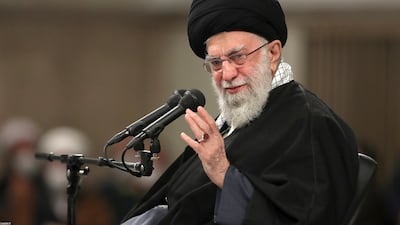A group of hackers has claimed responsibility for defacing websites associated with Iran's presidency.
The series of websites showed two leaders of an exiled opposition group on Monday in an apparent hack, with other sites showing pictures of Iran's Supreme Leader Ayatollah Ali Khamenei and Iran's President Ebrahim Raisi crossed out.
The account GhyamSarnegouni, which means “Rise to Overthrow” in Farsi, claimed responsibility for hacking websites associated with Iran's Foreign Ministry earlier this month.
Iranian state media and officials did not immediately acknowledge the apparent hack.
AP journalists accessing the sites found them defaced with images of Massoud Rajavi, the long-missing leader of the Iranian exile group Mujahideen-e-Khalq, and his wife Maryam, who is now the public face of the MEK.
One site bore the slogan: “Death to Khamenei Raisi – Hail to Rajavi.”
Mr Khamenei and Mr Raisi both were targeted in a similar cyber incident in May.
Iran has been the target of a series of hacks amid the rising tensions over its rapidly advancing nuclear programme, including cyber attacks on Iranian state TV signals and petrol pumps that provide subsidised fuel. Government surveillance camera imagery has also been released, including from a notorious prison.
The MEK did not immediately respond to a request for comment.
The group condemned a prisoner swap of a Belgian aid worker, in which an Iranian diplomat convicted of being behind a bomb plot aimed at the group was released on Friday.

The MEK began as a Marxist group opposing the rule of Shah Mohammad Reza Pahlavi. It claimed and was suspected in a series of attacks against US officials in Iran in the 1970s, something the group now denies.
It supported the 1979 Islamic Revolution, but soon turned against Ayatollah Ruhollah Khomeini, carrying out a series of assassinations and bombings targeting the Islamic Republic.
The MEK later fled into Iraq and backed Saddam Hussein during his eight-year war against Iran in the 1980s, resulting in many citizens opposing the group.
Although largely based in Albania, the group claims to operate a network inside Iran.

